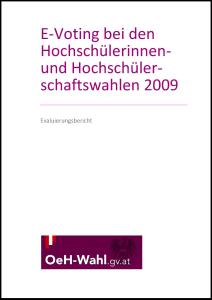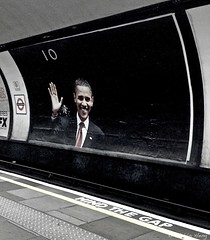Only articles in with the "elections" tag are displayed
To display all articles click
here.
 |
28. April 2010 – 19:44 by E-Voting.CC
|
 The final report on the Austrian E-Voting use is online an available for download in German here. Read the short summary of the report on Pep-Net.eu:
The final report on the Austrian E-Voting use is online an available for download in German here. Read the short summary of the report on Pep-Net.eu:
The implementation of e-voting for the elections to the Austrian Federation of students was one of the most sophisticated e-government projects in 2009. It’s aim was to complement the paper based voting with an electronic voting channel. Together with the implementation of e-voting the legal basis was adapted to include an electronic election administration.
This first of a kind implementation of e-voting in Austria was technically successful. Almost 1% (2.161) of the eligible students cast their votes electronically between 18th and 22nd of May 2009. For identification and authentication, they used the citizen card (the Austrian model of a smart card with digital signature) and a suitable smartcard-reader device, which was handed out for free. The anonymity was performed by using a cryptographic protocol in the post-electoral phase, similar to a paper based postal voting procedure. The e-voting servers were placed in two data centers of the Federal Computing Centre to allow for fail-safe operation.
The use of the citizen card was appropriate because of its associated high safety and powerful legal standing. However the penetration of the citizen card is rather low at present. Therefore, the federal ministry of science and research started the initiative studi.gv.at with the purpose to raise awareness and penetration of the citizen card amongst students. While over 14.000 students made use of this opportunity, only a small portion of them used e-voting. Main reason to this is the general limited number of applications aimed at students which make use of this card. The general acceptance and with it the penetration numbers for this smart card will only be reached when a wide range and a large number of additional services are provided with appropriate functionality, especially for students.
The discussion around e-voting was rather controversial with clear pro and contra positions. On the one side the federal ministry of science and research and on the other side selected representatives of the federation of students. The discussion dominated the electoral campaigns and hurt the institution of the elections.
For future uses of e-voting in Austria the penetration of identification and authentication means has to be raised as well as a more positive atmosphere amongst the stakeholders has to be reached.
by E-Voting.CC
Posted in Events, News, Projects, experince | No Comments »
 |
8. April 2010 – 10:52 by John Heaven (TuTech Innovation GmbH)
|

Photo by Melvinheng on Flickr
You’d think that a general election would be quite an exciting time in eParticipation. Indeed, that was one of my first ideas for a PEP-NET blog post. I’d make use of PEP-NET’s UK contacts to find some meaty examples of how people are participating in new and exciting ways and then blog about it.
Well that’s not quite how it worked out. I spoke to Peter Cruickshank, from the International Teledemocracy Centre at Edinburgh Napier University, who burst my bubble straight away:
“Many people think an election isn’t the best time to work on eParticipation, which often focuses on lobbying representatives between elections. In fact, the election can be something of a distraction.”
Okay. Well what about Andy Williamson from the Hansard Society?
“We won’t see anything like the Obama campaign in the UK because our system isn’t personality-centred like a presidential campaign. You need big personalities to build campaigns around, and our electoral system doesn’t work like that.” Read the rest of this entry »
Posted in Uncategorized | No Comments »
 |
2. February 2010 – 18:09 by ActValue Consulting & Solutions
|
Web 2.0’s great power cannot be ignored.
Politicians have shown to understand this issue very well. They know that this new
way of communication can be used as a powerful tool to disseminate political programs
and to influence voters. Independent studies have shown that in the US President
Barack Obama has won the elections thanks to young people as never before. This
part of the population has voted for the democratic candidate en masse (2 out of
3 voters) and the number of young voting people has increased, for the very first
time, much more in comparison to any other voting category. In fact the influence
of the evolution in communication in the Web2.0 era has changed the way voters follow
the election campaign.
Voters are no longer simple watchers but nowadays they are proactive subjects who
determined the political programs and trends through the power of the informal web
(e.g. forum, social network, blog, newsgroup e wiki) which means that citizens exchange
opinions (positive or negative ones) in a free way , without discrimination.
Similarly politicians should use the same tools to test, detect and understand how
their programs are perceived by the voters and they can stimulate discussions and
gather useful feedback. Based upon the outcome of last year’s election, we estimate
that in Italy candidates who will be able to exploit web 2.0 can win up to 30% of
the voters aged between 18 and 25, the ones who did not vote.
The analysis and interpretation of opinions, judgments and prejudices found on the
net is a core activity for the protection and the promotion of brands, products
and services, people in terms of visibility, reputation, credibility. Candidates
should borrow this model from marketing (e.g. President Obama is a brand) to supervise,
defend and emphasize their image in order to create a competitive advantage for
the future. Audience will resonate a candidate’s name to a good feeling of deep
trust. Thus it is very important, as a political strategy, to create a feedback
between information gathered on the net and the definition of a candidate’s political
program
Here below we propose a model which can be used for web reputation analysis in the
political contest.
|
Candidate
|
Alliance
|
Political program
|
Web Voice
|
|
Background
|
Mission
|
Social issues
|
Social issues
|
|
Curriculum Vitae
|
Scale of value
|
Economy & Jobs
|
Economy & Jobs
|
|
Relations skills
|
Basic principles
|
Tax
|
Tax
|
|
Communication
|
Sentiment
|
Foreign politic
|
Foreign politic
|
|
Empathy
|
Popularity rating
|
Domestic politic
|
Domestic politic
|
|
Popularity rating
|
|
Justice
|
Justice
|
|
|
|
Health care
|
Health care
|
|
|
|
Environement
|
Environement
|
|
|
|
Security
|
Security
|
|
|
|
|
|
This model needs to be detailed and refined. The analysis outcome will then include
a Position Map of web domains, built upon their relevance, their visibility and
the tone (either positive or negative) of the conversations they host.
Participating in a few selected conversations and stimulating the right channels
a candidate will then be able to create a positive environment and influence the
voters’ feelings towards his/her political messages.
Concluding, we can say that web 2.0 is a terrific tool and it may give good interaction
opportunities to everybody; on the other hand it requires professionalism, skill
and experience to define and execute winning political strategies.
Posted in Trends | No Comments »
 |
26. August 2009 – 13:25 by Hans Hagedorn
|
Expectation were high: The 2009 German Federal Election should be a real “online election” with big online campaigns, inspired by the success the Obama-campaign had had in 2008.
And indeed politicians like German chancellor Angela Merkel (CDU) or the counter-candidate Frank-Walter Steinmeier (SPD) do have their profiles in well-known social networks: You can find their profiles on Facebook as well as on the German social networks StudiVZ and MeinVZ. Candidates´ logos and websites resemble Barrack Obamas Websites with big pictures, videos and links to other online activities (see Merkel, Steinmeier).
But does it transferring the American campaign to the German Federal Elections really work?
Micah Sifri says: No!
Sifri founded the web-portal Personal Democracy and writes for the weblog Techpresident.com. In an interview with the German web-format “Elektrischer Reporter” he says that the main problem is that the German elections are status-quo-elections rather than change elections: “In a status-quo-election, where the candidates are not exciting, the internet won´t change that.” Only when there is a desire and a real chance for political change, volunteers who can exhaust the possibilities of the internet get more important.
According to Sifrin, Obama had understood the power of these volunteers and of voter generated activity and did not concentrate on one specific tool or one specific network, but on a combination of them all. (You can view the video-interview here: https://www.elektrischer-reporter.de/rohstoff/video/152/ . The audio is in English.)
Nevertheless some projects by civilians give an anticipation how a voter-driven activities online could look like in Germany. One of them is website “wechsel-waehler.de” (Wechselwähler meaning swing voter). Six swing voters moved in a shared flat where they will live until the elections. They blog about their political viewpoints and about recent news - and on each Sunday they have breakfast with a political guest. Videos of these Sunday roundtables can also be viewed on the website.
Simone Gerdesmeier, Zebralog Berlin
Posted in Interview, Trends, Uncategorized | 1 Comment »
 |
27. April 2009 – 11:24 by Civil College
|
This post is to highlight - although, we live in the same Europe, and have the same European Parliamentary representatives fighting for our interests (lol), the way, how they appear is really different.

In Hungary, for example only political parties can nominate EP candidates - through a list. This is somehow not only undemocratic, but if we take a look at the circumstances, they seem like artificial obstacles on the road, towards Bruxelles.
In Denmark, the situation is the same - only parties can nominate candidates (or it was a few years ago)
The first one- collecting the needed “supporting papers”.
In Hungary, you have to collect 20.000 for each party, who would like to appear on the list - in Finland it is 2000.
In Austria, where individuals can also be candidates without the party background, 2400 is the entry, and in Holland, 25 is enough, with 25 000 krones deposit, while in Luxemburg it is 250.
The UK is really different. You need only 30 supporters, and 5000 pounds to be on the menu.
These examples are to raise the attention and the hopeful debate around the issue of equality around the EP elections.
For me, it is obvious, that there is no place for such national characteristics in European democracy, where citizens are only capable to be elected as candidates in the EP, if they are members of a political party.
If there will be a constitution, it has to address this issue clearly. My other concern is, that possibly, not the EP, nor the Commission is responsible for these kind of questions.
What is in your mind?
MadCs
Posted in Trends, Visions | No Comments »
 |
20. April 2009 – 13:44 by Danish Technological Institute
|
by Morten Meyerhoff Nielsen, Danish Technological Institute
Much has been reported about the successful campaigning, fund raising and support canvassing by the 2008 Obama election campaign. Still the use of ICT to increase electoral participation, campaigning, consultation and voting is not a uniquely US phenomena. A multitude of eParticipation and eDemocracy initiatives exist. Ranging from eVoting in Estonia’s and Geneva’s national and regional elections, gender budgeting in Freiburg, consultation on local issues in Malmö to the political influence of bloggers in China or in the 2008 election crisis in Kenya. Information communication technology (ICT) in other words plays an increasingly important role in society.
As South Africans go to the polling stations on 22 April 2009, campaigning is being played out in traditional media (TV, radio, print), on the internet, on YouTube, Facebook, Twitter, in text messages/sms’s with street banners and in rallies across the country.
A full 173 parties – 134 at national level plus 39 purely provincial parties – are officially registered for the 2009 elections. Of these the four main ones are (alphabetic order):
-
ANC - African National Congress and currently in power with the support, in a tripartite alliance, of the smaller South African Communist Party (SACP) and the Congress of South African Trade Unions (COSATU)
-
COPE – Congress of the People in 2008 by formed members of the ANC
-
DA – Democratic Alliance and currently the official opposition
-
IFP – Inkatha Freedom Party a mainly regional party centered on the province of KwaZulu-Natal
Each of the main parties makes use of ICT in some form and in variety of ways and degrees. The table below outlines the use of websites and social networks (or Web2.0 technologies). Read the rest of this entry »
Posted in News, Tools, Trends, Visions | 5 Comments »
 |
30. January 2009 – 23:21 by Fraser Henderson - ICELE
|
 With over three quarters of Europeans unaware of the forthcoming EU parliamentary elections, an innovative viral marketing campaign has been devised to help spread the word. The aim is to improve the low voting and engagement figures and achieve a turnout of more than 25% in each of the key member states.
With over three quarters of Europeans unaware of the forthcoming EU parliamentary elections, an innovative viral marketing campaign has been devised to help spread the word. The aim is to improve the low voting and engagement figures and achieve a turnout of more than 25% in each of the key member states.
While responsible governments would normally vaccinate against any sort of outbreak, in this instance they are actively encouraging citizens to ‘catch the bug’. And this bug is every bit as infectious as the real thing - yet it’s completely harmless.
In-fact, it’s probably the opposite of a ‘bad bug’, if there is such as thing. The idea is to encourage email users to append a simple strap-line to their email signatures. The traditional email footer is occupied by variants of the corporate disclaimer blended with increasingly conscious notions, such as environmental pleas.
The code, available in a number of languages, has already been integrated into the email signature of 17,000 email users’. However, the project has an ambitious target of 20 million users. This simple yet effective measure is another example of the understated power of one of the most basic yet fundamental participation tools, email. Get your bug today and support this important campaign.
Posted in good practice | 1 Comment »
 The final report on the Austrian E-Voting use is online an available for download in German here. Read the short summary of the report on Pep-Net.eu:
The final report on the Austrian E-Voting use is online an available for download in German here. Read the short summary of the report on Pep-Net.eu:


 With over three quarters of Europeans unaware of the forthcoming EU parliamentary elections, an innovative viral marketing campaign has been devised to help spread the word. The aim is to improve the low voting and engagement figures and achieve a turnout of more than 25% in each of the key member states.
With over three quarters of Europeans unaware of the forthcoming EU parliamentary elections, an innovative viral marketing campaign has been devised to help spread the word. The aim is to improve the low voting and engagement figures and achieve a turnout of more than 25% in each of the key member states.








